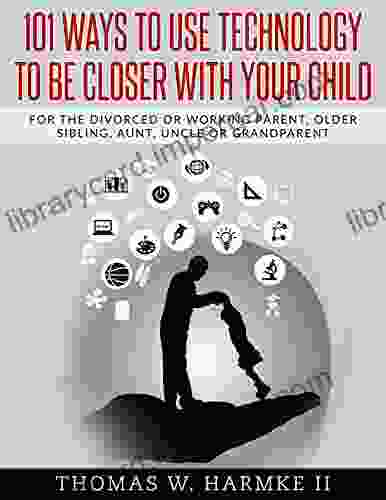A Guide for Extended Family Members: Supporting Children of Divorce

When parents divorce or separate, it can be a difficult and confusing time for everyone involved, especially the children. Extended family members can play a vital role in providing support and stability for these children during this challenging time.
4.8 out of 5
| Language | : | English |
| File size | : | 1822 KB |
| Text-to-Speech | : | Enabled |
| Screen Reader | : | Supported |
| Enhanced typesetting | : | Enabled |
| Word Wise | : | Enabled |
| Print length | : | 166 pages |
| Lending | : | Enabled |
This guide will provide you with information and advice on how to best support children of divorce. We will cover topics such as:
- Understanding the impact of divorce on children
- Communicating with children about divorce
- Providing emotional support
- Helping children cope with the practical challenges of divorce
- Building a positive relationship with the other parent
Understanding the Impact of Divorce on Children
Divorce can have a significant impact on children of all ages. Some of the common reactions children may experience include:
- Sadness, anger, and confusion
- Withdrawal from friends and family
- Changes in behavior, such as acting out or becoming more withdrawn
- Academic difficulties
- Sleep problems
- Physical complaints, such as headaches or stomachaches
It is important to be patient and understanding with children who are going through a divorce. They may not always be able to express their feelings in words, so it is important to pay attention to their behavior and offer support.
Communicating With Children About Divorce
One of the most important things you can do for a child who is going through a divorce is to communicate with them openly and honestly. This means talking to them about what is happening, answering their questions, and listening to their concerns.
When talking to children about divorce, it is important to use age-appropriate language and to be sensitive to their feelings. Here are some tips for talking to children about divorce:
- Start by telling your child that their parents have decided to divorce. Be honest and direct, but avoid using negative language or blaming either parent.
- Let your child know that they are not to blame for the divorce. Reassure them that both parents still love them and that they will always be there for them.
- Answer your child's questions honestly and openly. If you don't know the answer to a question, tell your child that you will find out and get back to them.
- Listen to your child's concerns and feelings. Let them know that it is okay to be sad, angry, or confused.
- Reassure your child that they will still have a relationship with both parents. Let them know that they can always talk to you or another trusted adult if they need support.
Providing Emotional Support
Children who are going through a divorce need emotional support from the adults in their lives. This means being there for them to talk to, listen to, and provide comfort.
Here are some ways you can provide emotional support to a child who is going through a divorce:
- Spend time with the child and let them know that you are there for them.
- Listen to the child's concerns and feelings without judgment.
- Offer reassurance and support.
- Help the child to develop coping mechanisms for dealing with their emotions.
- Encourage the child to participate in activities that they enjoy.
Helping Children Cope With the Practical Challenges of Divorce
In addition to providing emotional support, you can also help children cope with the practical challenges of divorce. This may involve helping them with things like:
- Adjusting to living in two homes
- Dealing with changes in their routine
- Managing their finances
- Making new friends
Here are some ways you can help children cope with the practical challenges of divorce:
- Be patient and understanding with the child as they adjust to their new living situation.
- Help them to create a routine that works for them.
- Teach them how to budget their money.
- Encourage them to get involved in activities that they enjoy.
- Help them to make new friends.
Building a Positive Relationship With the Other Parent
If possible, it is important to build a positive relationship with the other parent. This will help to create a stable and supportive environment for the child.
Here are some tips for building a positive relationship with the other parent:
- Communicate respectfully with the other parent.
- Put the child's needs first.
- Avoid badmouthing the other parent in front of the child.
- Work together to create a parenting plan that works for both of you and the child.
Building a positive relationship with the other parent can be challenging, but it is important to remember that the child's well-being should be your top priority.
Divorce can be a difficult time for everyone involved, especially the children. Extended family members can play a vital role in providing support and stability for these children during this challenging time.
By understanding the impact of divorce on children, communicating with them openly and honestly, providing emotional support, helping them cope with the practical challenges of divorce, and building a positive relationship with the other parent, you can help children to adjust to their new living situation and thrive.
4.8 out of 5
| Language | : | English |
| File size | : | 1822 KB |
| Text-to-Speech | : | Enabled |
| Screen Reader | : | Supported |
| Enhanced typesetting | : | Enabled |
| Word Wise | : | Enabled |
| Print length | : | 166 pages |
| Lending | : | Enabled |
Do you want to contribute by writing guest posts on this blog?
Please contact us and send us a resume of previous articles that you have written.
 Book
Book Novel
Novel Page
Page Chapter
Chapter Text
Text Story
Story Genre
Genre Reader
Reader Library
Library Paperback
Paperback E-book
E-book Magazine
Magazine Newspaper
Newspaper Paragraph
Paragraph Sentence
Sentence Bookmark
Bookmark Shelf
Shelf Glossary
Glossary Bibliography
Bibliography Foreword
Foreword Preface
Preface Synopsis
Synopsis Annotation
Annotation Footnote
Footnote Manuscript
Manuscript Scroll
Scroll Codex
Codex Tome
Tome Bestseller
Bestseller Classics
Classics Library card
Library card Narrative
Narrative Biography
Biography Autobiography
Autobiography Memoir
Memoir Reference
Reference Encyclopedia
Encyclopedia Kenneth Little
Kenneth Little Allison Tyler Lcsw
Allison Tyler Lcsw Erik S Herron
Erik S Herron Jean Davison
Jean Davison Alfred Michael Hirt
Alfred Michael Hirt Alegre Ramos
Alegre Ramos Sol Stern
Sol Stern Roy Adkins
Roy Adkins Alfred De Grazia
Alfred De Grazia Michael Asanga
Michael Asanga Alfred E Hartemink
Alfred E Hartemink Alan Wolfelt
Alan Wolfelt Amanda Owen
Amanda Owen Alice Boyes Ph D
Alice Boyes Ph D Michael Keen
Michael Keen Alexis Madrigal
Alexis Madrigal James E Ryan
James E Ryan Ali Katz
Ali Katz Catherine Davidson
Catherine Davidson Alex Danilovich
Alex Danilovich
Light bulbAdvertise smarter! Our strategic ad space ensures maximum exposure. Reserve your spot today!

 Ralph EllisonUnveiling the Unexpected Gifts of Fear: 'What If The Thing You Feared Most...
Ralph EllisonUnveiling the Unexpected Gifts of Fear: 'What If The Thing You Feared Most...
 Mikhail BulgakovUnlock the Gateway to Boundless Knowledge: Explore the Global Print Edition...
Mikhail BulgakovUnlock the Gateway to Boundless Knowledge: Explore the Global Print Edition... Christopher WoodsFollow ·10.4k
Christopher WoodsFollow ·10.4k Galen PowellFollow ·18.1k
Galen PowellFollow ·18.1k Martin CoxFollow ·19.5k
Martin CoxFollow ·19.5k Glenn HayesFollow ·15.4k
Glenn HayesFollow ·15.4k Ian PowellFollow ·6.8k
Ian PowellFollow ·6.8k Jaylen MitchellFollow ·7.1k
Jaylen MitchellFollow ·7.1k Dean ButlerFollow ·6.5k
Dean ButlerFollow ·6.5k Esteban CoxFollow ·16.8k
Esteban CoxFollow ·16.8k

 Ignacio Hayes
Ignacio HayesUnveiling the Secret Spitfires: Britain's Hidden Civilian...
: The Untold Story of Britain's...

 Scott Parker
Scott ParkerLiving With Schizophrenia: A Father and Son's Journey
Schizophrenia is a serious...

 Ted Simmons
Ted Simmons"From Sign Up to Pass Out": The Shocking and Immersive...
Step into the...

 John Keats
John KeatsThe Development of Biographies and Philosophical...
The Alluring...

 Dan Brown
Dan BrownCapture Your Dream Wedding with Digital Wedding...
Your wedding day is...
4.8 out of 5
| Language | : | English |
| File size | : | 1822 KB |
| Text-to-Speech | : | Enabled |
| Screen Reader | : | Supported |
| Enhanced typesetting | : | Enabled |
| Word Wise | : | Enabled |
| Print length | : | 166 pages |
| Lending | : | Enabled |










